Moisture Problems in Compressed Air – and How to Stop Them
Posted by EMILY OWEN

Compressed air systems are crucial in various industries, from manufacturing to healthcare. However, one common enemy that can wreak havoc on these systems is moisture. Moisture in compressed air can lead to a myriad of issues, including corrosion, reduced efficiency, and even equipment failure. So, how exactly does moisture damage your compressed air system, and more importantly, how can you prevent it?
What Causes Moisture in Compressed Air?
Moisture can enter a compressed air system through various means, such as ambient air containing high levels of humidity or inadequate drying mechanisms within the system. Additionally, as the compressed air cools, the moisture vapor present in the air condenses into liquid water, further exacerbating the problem.
The Impact of Moisture on Your System
Moisture in compressed air can lead to corrosion of pipes and equipment, reducing their lifespan and efficiency. It can also mix with lubricants, leading to the formation of sludge that can clog filters and valves. Furthermore, moisture can cause pneumatic tools to malfunction and compromise the quality of the end product in manufacturing processes.
Preventing Moisture Damage
Preventing moisture damage in your compressed air system is crucial for its longevity and efficiency. One effective way to combat moisture is by installing a refrigerated air dryer. These dryers work by cooling the compressed air, causing the moisture to condense and be drained from the system before it can cause any damage.
Another method is to use desiccant air dryers, which utilize adsorbent materials to remove moisture from the compressed air. Regular maintenance of your system, including draining any accumulated water from the tanks and filters, is also essential in preventing moisture-related issues.
Investing in Quality Equipment
When it comes to preventing moisture damage in your compressed air system, investing in quality equipment is key. High-quality filters, dryers, and separators can help ensure that your system remains free from moisture and operates at peak performance. Additionally, working with a reputable supplier who understands your specific needs can help you choose the right equipment for your application.
By understanding how moisture can damage your compressed air system and taking proactive steps to prevent it, you can ensure that your system operates efficiently and reliably. Remember, prevention is always better than cure when it comes to maintaining your compressed air system.
TAGS:
